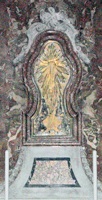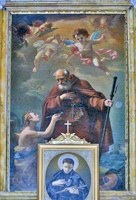


The Sacro Chiodo (a nail that had been used in the Crucifixion of Christ) is in the Cappella Benedetti of San Domenico. According to tradition, the Blessed Gregory of Spoleto acquired the relic in the 15th century. There are in fact competing traditions as to how this came about:
-
✴According to one tradition, St Helena, the mother of the Emperor Constantine recovered it in Jerusalem in the 4th century. She threw it into the Adriatic to still a terrible storm that threatened to wreck the ship on which she returned to Italy and Gregory found it on the Adriatic shore centuries later.
-
✴According to the other tradition, he acquired it during a pilgrimage to Jerusalem.
When Gregory died in 1473, the relic was not immediately recognised. However, a smith who tried to melt it discovered its miraculous properties and gave it to the friars at San Domenico. It apparently cured Pope Gregory XIV of a malady when he stayed in the convent in 1591. (The cure was short-lived and he died shortly afterwards).
The relic is in a silver reliquary (1726) inside another that is gold-plated., both of which are the work of the Roman goldsmith Ludovico Barchi. The silver reliquary is exposed for worship each year on Good Friday and on 3rd May.
The frescoes in the Cappella Benedetti of San Domenico, which are attributed to Liborio Coccetti, depict:
-
✴two scenes from the miracle of the “Sacro Chiodo” in the lunettes:
-
•an angel guides the Blessed Gregory of Spoleto to recover the relic; and
-
•a bishop cures a blacksmith by touching him with the relic; and
-
✴scenes from the Passion of Christ in the cupola:
-
•Christ nailed to the cross;
-
•the Crucifixion;
-
•the Pietà; and
-
•St Helena, the mother of the Emperor Constantine, throwing the sacred nail into the Adriatic to still a terrible storm that threatened to wreck the ship on which she returned to Italy from Jerusalem.

Return to Saints and Venerated Objects of Spoleto.

